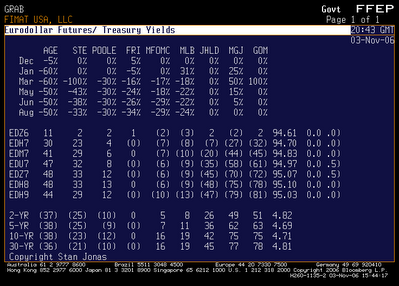So much market opinion comes from savants proclaiming an inevitable recession because a 5.25% fund rate will dry up home equity lines as a source for spending. Here's a novel idea to these seers who take ceterus paribus to the extreme -- how about employment and income growth contributing to consumer well-being? Here is another novel thought, there is plenty room for the share of capital to flow back to labor before inflation becomes a problem, as this chart aptly illustrates:

In case you think this is the rant of an aging socialist, here are some words from today's Stephen Beckner article on what the Fed thinks of the data:
"The Fed is not alarmed by climbing labor costs at this stage. Officials have been expecting some increase in wages in the belief that they were due to "catch up" to past productivity gains which until recently served mainly to swell profits.. . . . .
. . . .It's possible that rising labor costs will just be part of a return to more historical norms on the labor share and the profit share, but that's not guaranteed," a senior Fed source said. "It's a rising cost pressure. It won't necessarily feed into inflation, but it's something that has to be taken into account."
That room for catch-up comes from the sharp dip in the blue line since 2000.
As for the ease potential priced into the Eurodollar contracts, beginning with Mar 07, understand what inflation the Fed is concerned about. They are not focused on price swings in energy and other commodities. That is the stuff that makes free market economies free. They instead focus on a broader increase in costs that gives truth to the Friedman view that inflation is a monetary phenomenon. This recovery sits on top of a mountain of liquidity. Hence the following from the same article:
"Comments by Fed sources suggest that, while labor compensation pressures are not worrisome enough in the current economic context to force a resumption of policy firming anytime soon, they are enough of a concern, together with other considerations, to reduce chances of Fed easing......
Echoing the FOMC minutes, a Fed official said, "trend might be a little lower than in recent years, in part because of slower productivity growth, in part because of slower labor force growth. Our bottom line expectation is not for a big output gap being opened up by slowing growth -- maybe something small."
"So that by itself isn't going to be a very strong disinflationary force," the official continued. "I don't think we can necessarily expect slower growth by itself to bring inflation down very rapidly from where it's been.""
Once again, if there is no ease in January why expect an ease by July? And if those back Eurodollar contracts return to pricing "no ease", there is a 25 basis point risk in the two-year (yesterday it was 40). Understand the risk to understand the reward.
I leave with where the market has priced the odds (they still believe 100% that there is a 25bp ease by next summer).

No comments:
Post a Comment